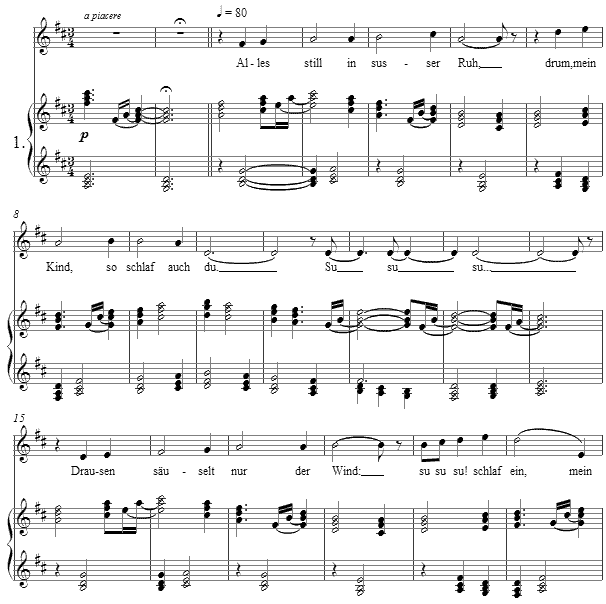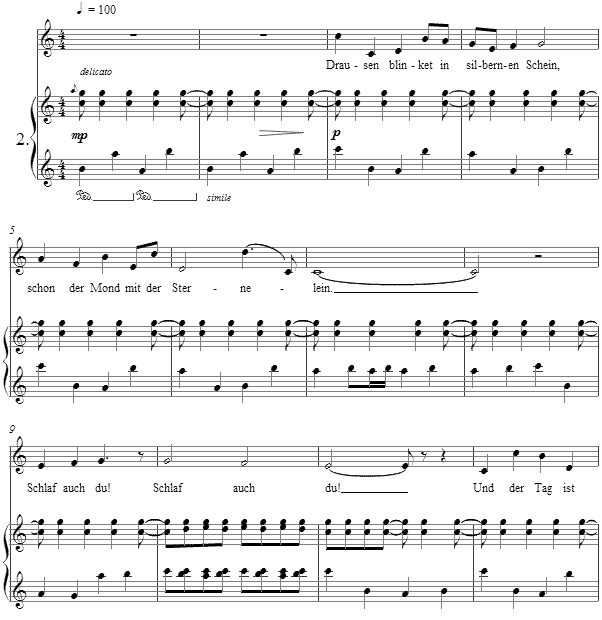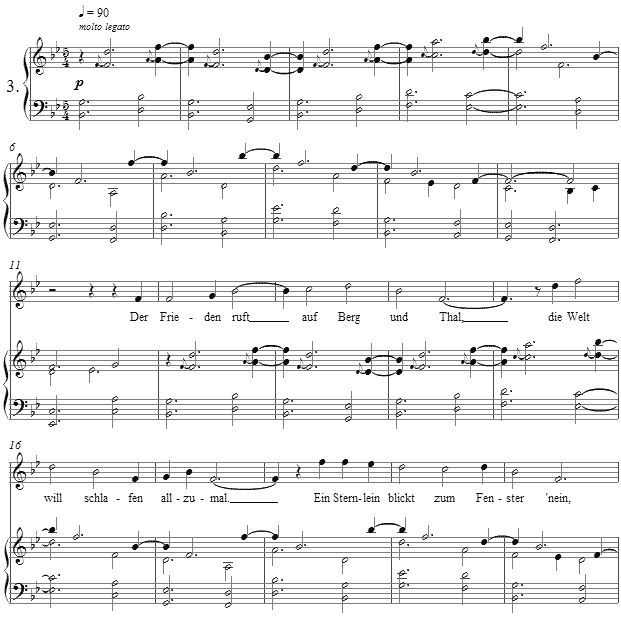Music and Texts of GARY BACHLUND
Vocal Music | Piano | Organ | Chamber Music | Orchestral | Articles and Commentary | Poems and Stories | Miscellany | FAQs
Wiegenlieder - (2007)
Hoffman von Fallersleben
for medium high voice
i. Alles still in süßer Ruh [ 3 pages, circa 2' 50" ]
Alles still in süßer Ruh,
Drum, mein Kind, so schlaf auch du!
Draußen säuselt nur der Wind:
Su su su! schlaf ein, mein Kind!
Schließ du deine Aüdgelein,
Laß sie wie zwei Knospen sein!
Morgen, wenn die Sonn' erglüht,
Sind sie wie die Blum' erblüht.
Und die Blümlein schau' ich an,
Und die Aüglein küss' ich dann,
Und der Mutter Herz vergißt,
Daß es draußen Frühling ist.
ii. Schlaf auch du! [ 4 pages, circa 3' 15" ]
Draußen blinket in silbernem Schein
Schon der Mond mit den Sternelein,
Und der Tag ist wieder entfloh'n,
Blumen und Vögel sie schlafen schon.
Su su su!
Schlaf auch du!
Schlafe, mein Kindchen, in süßer Ruh!
Leid und Freude, Kummer und Qual
Ziehen noch über Berg und Thal,
Suchen Herberg' im Abendschein,
Schleichen in Haus und Herzen ein.
Su su su!
Schlaf auch du!
Schlafe, mein Kindchen, in süßer Ruh!
Kommt die Freude, wir lassen sie ein,
Leid und Kummer soll draußen sein.
Nur die Freude halte die Wacht
Fröhlich bei dir die lange Nacht!
Su su su!
Schlaf auch du!
Schlafe, mein Kindchen, in süßer Ruh!
Schleicht das Leid sich dennoch ein,
Heißt, mein Kindchen, dich weinen und schrei'n,
Eilt die Mutterliebe herzu,
Sitzt an der Wieg' und singet im Nu:
Su su su!
Schlaf auch du!
Schlafe, mein Kindchen, in süßer Ruh!
iii. Dein Sternlein wacht [ 2 pages, circa 3' 00" ]
Der Frieden ruht auf Berg und Thal,
Die Welt will schlafen allzumal.
Ein Sternlein blickt zum Fenster 'nein,
Und fragt: schläft Kindlein noch nicht ein?
»Mein Kind ist gut und folget gern,
Das weißt du ja, mein lieber Stern!« –
So wünsch' ich ihm denn gute Nacht,
Schlaf wohl, lieb Kind! dein Sternlein wacht.[ 9 pages, circa 9' 05" ]
Hoffman von Fallersleben
As a poet, it is commented that Hoffman von Fallersleben "acquired distinction chiefly by the ease, simplicity and grace with which he gave expression to the passions and aspirations of daily life." Although not trained in music, he composed melodies for many of his songs, and a considerable number of them are still sung. Among the best known is the patriotic "Deutschland, Deutschland über Alles," composed in 1841. For more details about his life, see the page about my short cycle of children's songs, Mäuselein, Mauskätzchen und Spätzchen.
Written with a limited range, these gentle songs reflect the texts, moving from a 3/4 meter through to the final 5/4 meter. The first setting is an earnest lullaby, in which clusters of non-root position diatonic chords linger causing a sweet dissonance between them.
The second setting is structured around a set of fulcrums, in which one hand of the accompaniment plays both above and beneath another, while the first vocal lines are a "crab" in which the fulcrum and division between the upper and lower tones is the dominant tone in similar fashion to the accompaniment. The triple meter of the first lullaby gives way to this setting in a solid 4/4 meter.
The last of these cradle songs is set in 5/4, sixths making up the voicing texture of top and bottom lines in the accompaniment. The vocal line hints at changing meters, though the accompaniment's structure allows these within its form. It is marked molto legato, and should be performed with simplicity.
This short cycle was finished while staying at the Hotel Marx in Aachen, most comfortable and serene accommodations a traveler.
The score to Wiegenlieder is available as a free PDF download, though any major commercial performance or recording of the work is prohibited without prior arrangement with the composer. Click on the graphic below for this piano-vocal score.



